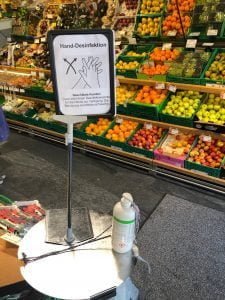As the light at the end of the tunnel is yet to be seen for the COVID-19 pandemic, most Malaysians are adhering to the Movement Control Order. In many ways, this has helped to slow down the spread of the virus nationwide. Sharidan Ali talks to a few Malaysians living abroad, on how they are coping with the situation in a foreign land, and why they choose not to travel back home during this difficult time.

According to Surina Khalid*, a 44-year-old English teacher who is living in Switzerland, she doesn’t feel the need to go back to Malaysia during the COVID-19 pandemic, for fear of contracting the virus at the airport or in flight.
“Furthermore, there are very limited flights available and the prices have gone up a bit. I also don’t want to leave my husband alone. He still has to work, albeit at home since March 17.
“Since I moved here three years ago, I don’t have a place to stay in Kuala Lumpur anymore. If I decided to go back, with whom should I stay during this lockdown period? Will I be quarantined when I get home?” she wonders.
Surina explains she feels safe and confident on how the Swiss authorities and health services are handling the matter.“I must admit the situation here is much worse than Malaysia, as Switzerland borders three other nations namely Italy, Germany and France which are also badly hit by the COVID-19,’’ she says. At the time of writing, the small Alpine country with a population of 8.57 million people has recorded 26,487 cases of infection and 1,271 deaths.

Meanwhile, Italy with a population of 60.36 million people has recorded 165,155 cases of infection and 21,645 deaths, Germany with a population of 83 million people has recorded 135,549 cases of infection and 3,850 deaths. Also, France with a population of 67 million people recorded 134,598 cases of cases and 17,888 deaths.
Collectively, Europe has seen over a million cases of infection and over 89,000 deaths as of Apr 16. “When the news of the COVID-19 first caught my attention in early February, I felt it would never get to this stage. But, when Italy recorded a sharp spike in the number of infections by the end of February, I started to get worried,’’ she says.
Surina says Switzerland has been in a lockdown since March 17 and it should end in stages from April 26 onwards. “Currently, people are advised to work and stay at home as much as possible. Only essential stores such as supermarkets, clinics and pharmacies are allowed to remain open.
“Public gathering is limited to less than five people. I must say people here are following the guidelines pretty well and I can see the positive effect on the daily rate of infection,” she says. But, Surina admits that she misses going out and socialising.

“We have quite long winter months here and we’ve been staying indoors most of the time since November. Now as the weather is starting to thaw out in spring, we can’t go out as usual. “My husband and I only go out to get groceries and do some exercises together. “But we must make sacrifices to save life. My advice to all other Malaysian diaspora is to stay where you are if the situation in your country of residence is not too bad,’’ she says.
For Philip Raj Augustine, a freelance journalist who lives in New York City, the COVID-19 pandemic has made him changed travel plans to Malaysia or any other places in the world this year. New York is currently the worst city in the world being affected by the coronavirus with 222,284 cases and 12,192 deaths. The United States with a population of 328.2 million people recorded a total of 659,674 infections and 30,207 deaths as of Apr 15.
“My life partner and I travel regularly and not being able to fly has changed our routine quite a bit. “We can’t visit my parents in Kuala Lumpur and they too can’t fly to us. “As much as I miss my parents and friends in Malaysia, I will have to make do with video calls and social media to connect with my loved ones for now,” he says.
Currently, Philip says they are on a self-imposed lockdown in their house in Long Island since March 14 and have yet to return to their apartment in Manhattan. “It is vital to follow the advice from local government as this is not a drill. This pandemic is probably the scariest situation I’ve ever been in. New York governor Andrew Cuomo has just extended the coronavirus shutdown to May 15.
“Just remember to be kind to everyone and reach out to family and friends,” he says. In another country, Noel Dass, a 37-year-old graduate student in Montréal, Canada, echoes similar opinion to avoid travelling back home unless it is necessary. “Stay home as much as you can. Reach out to friends and family and look out for resources out there that can help you. Take care of your mental health and not let yourself be overwhelmed by the news or social media,” he says.
According to Noel, as of April 15, there are a total of 28,899 cases and 1,048 deaths across Canada. “Québec and Montréal have roughly half the cases in the country,” he says. Canada has a population of 37.6 million people.

On the lockdown, Noel says he has been at home for over a month now and only left the house about five times for groceries and walks. “I try to get most of my groceries online but it’s difficult because of long waits for delivery slots and by the time the orders are assembled, I rarely get everything I’ve ordered. “I was supposed to return to Malaysia at the end of April for a break, but that trip has been postponed indefinitely.
“I am able to work from home till the term ends in a week or so as I am a teaching assistant, so that keeps me a bit busy. But I am now looking for work for the summer and that will be a challenge,” he says. On the bright side, Noel says he has been having many video and telephone calls with colleagues, friends and family around the world.
“Ordinarily I would text, but I find myself speaking to people more often and this helps quite a bit because I get to see people on a screen. “I’ve been trying not to think too much about the uncertainty of the coming months and taking things on a day-to-day basis to maintain my sanity,” he says.
Meanwhile, Jamie Hoi, a 42-year-old housewife in Melbourne, Australia, also advises other Malaysians living overseas to stay where they are instead of rushing back to Malaysia. ‘’In most instances it is not easy to get a flight anyway. If you are in a safe space with access to shelter, food and healthcare, then stay.
‘’Don’t travel unless you must. In Australia, currently the highest transmission rate is from overseas travel,’’ she says. Of the 6,468 confirmed cases in Australia, 63 have died from COVID-19. Australia has a population of almost 25 million people. On coping with the lockdown with her husband and two children at home, Hoi says they do not feel like there is an immediate threat to their health, as yet.
“We live in a suburb which is spread out and have limited to no contact with people should we decide to walk down the street. “For us, the main restriction is not being able to travel to visit friends and family. There are no major restrictions buying groceries. We can drive to get essential items and medicines. We can walk the dog with the kids when needed,’’ she says.
However, Hoi stresses that the main goal for the lockdown is to protect those who are more susceptible to the adverse effects of COVID-19. “This is to ensure that the healthcare facilities have enough resources to help those who are really in need of medical assistance,” she says.

Recollecting the series of events when she first heard about the coronavirus in January, Hoi says she and her family did not worry so much then. “We were still in Kuala Lumpur and returned to Melbourne on January 24. “Most parts of China had been locked down and I thought the country was ‘handling it’. “However, it became scarier when COVID-19 was found in other countries and people were dying,” she says.
